Marine Life & Conservation
The Lionfish Kings of Grand Cayman’s East End
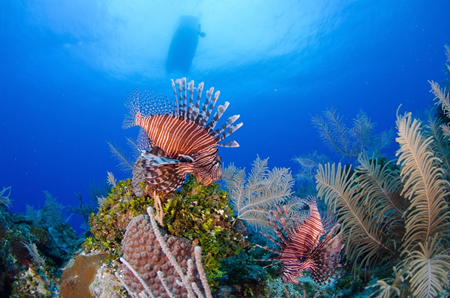
“Lionfish are beautiful, resilient and strong – a cool fish – but they are deadly to our reefs and if we don’t stop them something bad is going to happen,” says Matt Russell, a divemaster/instructor at Ocean Frontiers who has watched the invasion with deep concern for the marine environment. Russell is a dedicated, educated and skilled warrior in the fight against the predatory Lionfish, consistently culling large numbers on dives – a record 56 fish during a 2-tank dive. He’s also a member of the very exclusive “30 Club” whose members have removed 30 or more Lionfish on a single dive. Matt also teaches customers how to safely and humanely remove the invasive species from the reefs.
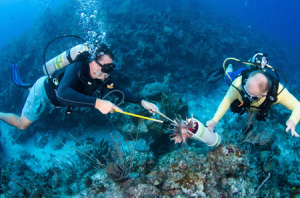 “The hunt was wickedly fun at first, but now I feel an obligation to get as many people involved as I can,” he says. Matt and his co-workers follow the lead set by their boss Steve Broadbelt (also a member of the 30 Club) who is out there hunting and spearing as many Lionfish as he can on company culls. “We’re pretty competitive! Steve ‘gets it’ and understands that we need to keep the pressure on.”
“The hunt was wickedly fun at first, but now I feel an obligation to get as many people involved as I can,” he says. Matt and his co-workers follow the lead set by their boss Steve Broadbelt (also a member of the 30 Club) who is out there hunting and spearing as many Lionfish as he can on company culls. “We’re pretty competitive! Steve ‘gets it’ and understands that we need to keep the pressure on.”
This attitude and the resulting teamwork is why Ocean Frontiers is winning the local battle against invasive Lionfish prowling the reefs at East End, if not the broader war against the predator. Broadbelt and his team aggressively press on, culling as many predators as they can, and encouraging locals and customers to get involved in the fight. In March they crossed an important thresh hold – they have removed 10,000 Lionfish from East End reefs since they began culling three years ago.
Also this month their best customer for the fish, Chef Ron Hargrave, who operates Tukka at East End and Eagle Ray’s Dive Bar & Grill at Compass Point Resort, calculates that he has purchased 6000 pounds of Lionfish at a cost of $25,000. This partnership between Broadbelt and Hargrave is an example of how the community can help fight the Lionfish invasion, and it exemplifies the hope behind the mantra being repeated across the Caribbean: to beat them eat them.
Culling invasive Lionfish is a day in, day out challenge, and while eradicating them completely from Cayman’s reefs is unlikely, Ocean Frontiers is hoping to keep the predator population manageable at East End dive sites. Once a week, Ocean Frontiers runs a one-tank afternoon cull, and customers are asked to help by being Lionfish spotters for trained cullers. This helps keep the Lionfish population low on regular dive sites, but a more aggressive approach is needed for other areas of the reef not regularly dived. Ocean Frontiers also offers an all-day 3-tank cull once a month for Cayman residents who are licensed to use spears and have their own DoE approved spears. The dive operation also offers a culling class, taught by Matt Russell, for customers interested in being trained and licensed to spear Lionfish.
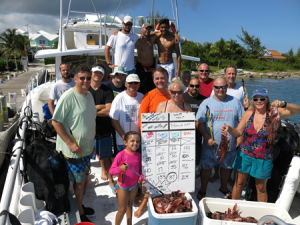 “These trips target the hard to reach areas that are too far to get to on a typical half day trip,” says Broadbelt. “We’ve also developed what we call ‘parachute drop culling’ where we split the residents into three teams and drop them off along the reef sequentially the estimated distance apart that they are expected to cover. This enables us to cull over 1 mile of linear reef at a time and has resulted in many top scores. This method can only be used in the right conditions with advanced divers that we are comfortable with… I would class it as an extreme dive, but worth the results.”
“These trips target the hard to reach areas that are too far to get to on a typical half day trip,” says Broadbelt. “We’ve also developed what we call ‘parachute drop culling’ where we split the residents into three teams and drop them off along the reef sequentially the estimated distance apart that they are expected to cover. This enables us to cull over 1 mile of linear reef at a time and has resulted in many top scores. This method can only be used in the right conditions with advanced divers that we are comfortable with… I would class it as an extreme dive, but worth the results.”
The numbers tell the story: to date Ocean Frontiers has culled a total of 10,202 Lionfish; 1008 divers have participated in culling dives; the most fish ever culled in one day is 320; the most culled by a single diver in one dive is 39; the longest Lionfish caught is approximately 13 inches measured from nose to base of tail; the smallest is about 2 inches. Everything is carefully documented and the results are reported to the Department of Environment where a Lionfish database is kept.
Chef Ron Hargrave takes all the Lionfish being harvested at East End, no matter the size, and adds them to his menu. He says most of their customers are aware of the issue and support the cause by ordering at least one Lionfish dish – among the most popular are the famous Lionfish Tacos served at Eagle Ray’s Dive Bar & Grill.
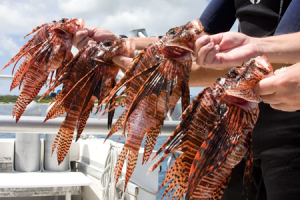 “Customers love it! And why not… Its delicate, flakey, white meat is very mild and extremely tasty,” he says, adding that demand is going up all the time.
“Customers love it! And why not… Its delicate, flakey, white meat is very mild and extremely tasty,” he says, adding that demand is going up all the time.
“The Lionfish tacos at Eagle Ray’s are probably the best I’ve ever had and they are on the menu 100% of the time,” says Matt Russell who often recommends them. “I’ll ask customers ‘did you try those fish tacos? I caught them!’”
Steve Broadbelt says licensed local cullers joined the fight once they understood the threat posed by the Lionfish, and they continue to be involved.
“Divers do not like harming or killing (culling) marine life, but we have to be smarter than our emotions and understand the damage the Lionfish are doing and the importance of our environmental work,” he says. “We employ some of our own techniques to make sure the Lionfish are terminated as quickly and humanely as possible. There is no reason to make them suffer – they are just not welcome here.”
“You have to take care of the things you love and there are few things I love more than Cayman’s reef life,” says local customer Mark Rovner, a licensed spearer. “At first I was apprehensive about killing fish, but once you understand the horrific damage these invasives can do, you realize there’s no choice. And if not me, who?
Broadbelt says getting Ocean Frontiers customers involved in culling is easy when they become aware of the threat Lionfish pose and sometimes a little competition keeps the hunt interesting.
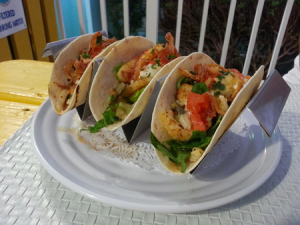 “We make the culling trips fun and competitive by encouraging a little rivalry and team spirit,” he says. “Most divers don’t need motivation. They care about the environment and there is always this desire to do a good thing and help with the problem. Some of them just love it and can’t get enough.”
“We make the culling trips fun and competitive by encouraging a little rivalry and team spirit,” he says. “Most divers don’t need motivation. They care about the environment and there is always this desire to do a good thing and help with the problem. Some of them just love it and can’t get enough.”
Is regular culling it working? Broadbelt says the data they’ve collected and submitted to the Department of Environment indicates that Lionfish counts and sizes are being reduced. Customers are also seeing fewer of them during dives on return trips.
“When I started, the lionfish populated almost every dive site. Now it is a surprise to see a lionfish,” agrees regular customer John Sharp who has participated in culling dives.
“Yes culling is making a difference, but it is like a leaking boat,” says Steve Broadbelt. “Every time we bail out some water… more just keeps coming back in. We can keep bailing and bailing, but we have to find a better long term solution.”
For more information on Ocean Frontiers, visit www.oceanfrontiers.com.
Marine Life & Conservation
Paul Watson Released as Denmark Blocks Japan’s Extradition Bid

Renowned anti-whaling activist Paul Watson has been released from custody in Greenland after spending five months in detention. Denmark’s Justice Ministry rejected Japan’s request for his extradition, citing insufficient guarantees that his time already served in custody would be credited against any potential sentence.
The 74-year-old Canadian-American was arrested on July 21 in Nuuk, Greenland’s capital, when his ship docked to refuel. His arrest was based on a 2012 Japanese warrant related to a 2010 encounter in Antarctic waters. Japan alleged Watson obstructed operations and caused damage to a whaling research ship during efforts to disrupt illegal whaling. Watson has consistently denied these claims, maintaining his commitment to marine conservation.
Denmark, which oversees extradition matters for Greenland, concluded that while the legal conditions for extradition were met, the lack of assurances from Japan regarding time-served credit made extradition untenable.
In a video shared by his foundation, Watson expressed gratitude and relief, saying, “After five months, it’s good to be out… and good to know they’re not sending me to Japan.” He added that the most difficult part of his time in custody was being separated from his two young sons.
Watson is a pioneering figure in marine conservation, known for founding the Captain Paul Watson Foundation in 2022 after decades of activism with the Sea Shepherd Conservation Society. His bold efforts to defend marine life have earned him widespread support, including from celebrities and conservationists. His work has also been featured in the acclaimed reality TV series Whale Wars.
Watson’s lawyer, Jonas Christoffersen, praised the decision, stating, “We are happy and relieved that Paul Watson is now free.” He added that Watson is eager to reunite with his family and continue his vital work.
The arrest occurred while Watson’s vessel, the M/Y John Paul DeJoria, was en route to the North Pacific with a team of 26 volunteers to intercept a Japanese whaling ship. His foundation described the arrest as politically motivated and emphasized that Watson’s actions were focused on ending illegal whaling practices.
Japan resumed commercial whaling in 2019 after leaving the International Whaling Commission, asserting that whale meat is a cultural tradition. Conservationists, however, continue to challenge these practices, highlighting their impact on marine ecosystems.
Despite the challenges, Watson remains steadfast in his mission to protect marine life and bring attention to whaling practices. His dedication to ocean conservation has made him a globally respected advocate for the environment.
Marine Life & Conservation
12 Days of Zero-Waste Fish-mas

This holiday period, the Marine Conservation Society, the UK’s leading ocean membership charity, invites you to make some simple changes to eating fish this Christmas to help our seas.
Dr Kenneth Bodles, Head of Fisheries and Aquaculture at the Marine Conservation Society, said, “During the festive season, our consumption increases, but so does waste. Sustainability isn’t just about where food comes from – it’s also about how you use it. By reducing waste and making the most out of your seafood, you’re not only taking steps to be more ocean-friendly, but can also help to cut costs during what is often one of the most expensive times of the year”.
The Marine Conservation Society has compiled twelve tips on how to consume seafood sustainably with zero-waste this Christmas:
Buy whole fish instead of fillets
Instead of fillets, consider buying whole fish such as salmon, hake, or lemon sole. By adopting a “nose to tail” approach with cooking, whole-baked fish not only feeds a crowd, but also helps to minimise waste and maximise sustainability by using up every part of the animal, including bones, skin, and fat.
Make fish stock
Leftover fish bones or shells can be put to good use by boiling them to make a nourishing fish stock or bisque. This can be frozen and preserved for later use and makes for a flavourful base in a soup.
Make your own fish pâté
Avoid waste by turning leftover fish, such as smoked mackerel or salmon, into a delicious pâté by blending with cream cheese and lemon. Perfect when paired with crackers.
The sustainability of salmon and mackerel varies depending on where and how it is caught or farmed. For more information on green-rated options, check the charity’s Good Fish Guide.
Buy frozen
By purchasing seafood that is frozen or vacuum-packed, this helps to reduce waste by extending the shelf life of your food.
Fish pie
If you’re wondering what to do with leftover cooked fish, why not opt for a classic fish pie with mashed potatoes, leeks, and a cheesy sauce? A sure crowd pleaser on Boxing Day.
Use the head
Don’t forget the fish head! The meat is incredibly tender and flavourful. The charity recommends a cod’s head curry or recreating Fallow’s renowned cod’s head in siracha butter.
By stretching your ingredients further, not only is this a more sustainable way to enjoy seafood, but also cost-effective by repurposing leftovers and cooking creatively.
Boxing Day brunch
Mix leftover kippers or smoked salmon with scrambled eggs for a tasty, zero-waste, Boxing Day brunch.
For best choice, make sure you buy kippers, or herring, from the North Sea and the North Irish Sea.
Zero-waste storage
A top tip from the Marine Conservation Society to avoid waste is freezing fish offcuts to save for future use.
Crisp up the skin
Even leftover fish skin can be turned into a quick savoury snack by crisping it up in an air fryer with a little olive oil and salt.
Anchovies two ways
Leftover anchovies can either be blended with butter to make a delicious anchovy butter or tossed into pasta for a hit of umami flavour.
The charity recommends opting for anchovies caught in the Bay of Biscay for best choice.
Fishcakes
For an easy, zero-waste meal, leftover seafood trimmings can be mixed with mash and fried in breadcrumbs to make fishcakes.
Pickled mussels
Try pickling mussels in 1:1 vinegar and water, with a dash of sugar for a sustainable, zero-waste snack that can be enjoyed well beyond the festive season.
Mussels farmed in the UK are a seafood superhero. Grown using low-impact methods and harvested by hand, they get all the food they need from the sea around them. This makes them one of the most sustainable, ocean-friendly, and cost-effective seafood options.
Players of People’s Postcode Lottery have raised £6.6M towards the Marine Conservation Society’s vital work in making seafood more sustainable.
Laura Chow, Head of Charities at People’s Postcode Lottery, said: “Fish is a festive favourite for many, but making sustainable choices when it comes to how we buy and eat seafood makes all the difference for our ocean. Support from players of People’s Postcode Lottery has helped the Marine Conservation Society further its sustainable seafood work, so that we can all enjoy healthier, better protected seas.”
The Marine Conservation Society encourages you to make sustainable seafood choices a year-round habit, not just for Christmas. To check how sustainable the seafood on your plate is, you can visit the charity’s Good Fish Guide. The Guide helps consumers and businesses identify the most sustainable seafood using a simple traffic light system, based on where and how species are caught or farmed. Green is the best choice, amber means improvements are needed, and red indicates fish to avoid buying.
Zero-waste gift idea
Why not embrace a zero-waste Christmas by gifting a membership to support marine conservation? It’s a meaningful, low-waste gift that helps protect our ocean for generations to come. Memberships start from as little as £5 a month – the price of a sandwich and drink from your local coffee shop.
Find the latest sustainable seafood advice for wild-caught and farmed seafood on the Good Fish Guide, downloadable to your phone from www.mcsuk.org/goodfishguide.
-

 News2 months ago
News2 months agoIconic SS United States to become the World’s Largest Artificial Reef
-

 News3 months ago
News3 months agoBook Review – 52 Assignments: Underwater Photography
-

 Gear News3 months ago
Gear News3 months agoDYNAMICNORD – New German diving brand enters the British market
-

 News3 months ago
News3 months agoExploring Cenote El Pit: A Diver’s Dream
-

 Gear News3 months ago
Gear News3 months agoTry BARE drysuits (and maybe even win one!) this Friday with Sea & Sea at North West Dive Fest
-

 Marine Life & Conservation3 months ago
Marine Life & Conservation3 months agoBook Review: Coral Triangle Cameos
-

 Blogs2 months ago
Blogs2 months agoDive the Egyptian Red Sea this Autumn with Regaldive
-

 News3 months ago
News3 months ago2024 Ocean Art Underwater Photo Competition Announced















